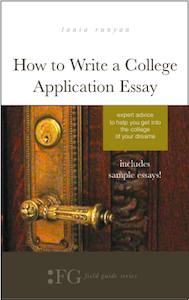Meet the Essay Expert
Tania Runyan is one of the fastest, strongest writers I’ve ever met. And I meet a lot of writers, since I’m an editor and a publisher.
Unlike many writers, though, Tania can clearly explain how you can be a great writer, too—starting with how to be a great reader. Her popular titles How to Read a Poem and How to Write a Poem are used in high schools, colleges, and even MFA classrooms across the country. (One teacher shared his students’ poems with me, after they used How to Write a Poem as their central creative writing text, and I was stunned at the quality. Really, I was. Read these sestinas if you want to be amazed along with me.)
When Tania put her hand to writing about the college application essay, it was a natural fit. As a sought-after ACT/SAT tutor and writing coach, she’d been helping students with the college admissions process for over 14 years, and they’d been so thankful for her good humor, surprising techniques, and easy-to-understand advice.
I asked Tania to share more about her own background and her college app essay writing advice, so you could meet her and get advice for writing your own great essay. (By the way, feel free to share your finished essay in the comment box at this post, and someday when Tania is ready to create an updated edition of her college essay guide, you might even be quoted or featured—with your permission, of course.)
Tips on How to Write a College Application Essay and Why Colleges Ask You to Bother (Plus, Why the Expert Cares)
1. How did you first start helping students write their college application essays? Why did you keep doing it?
As a high school English teacher who was always assigned two classes of seniors, I needed to teach a college essay unit at the beginning of the year. It was one of my favorite tasks, because I was essentially teaching advanced narrative writing. I’ve always loved helping students discover their voices. The “high stakes” nature of this assignment only added to the excitement.
Watching students get into colleges they loved while also learning something important about themselves was so rewarding that when I resigned from teaching to start my own tutoring business, I made college application essays a primary focus.
2. What’s the number one mistake students make when beginning the college application essay process?
At first, many students think the goal is to impress the admissions office with a description of accomplishments. No! That’s what the application is for.
Here’s a simple rule of thumb to write by: if it’s on your app, don’t write about it, unless you can approach it from a very personal, unique angle. The essay is your opportunity to open a window into yourself, not your activities. If you’re so busy and stressed at this point in your life that it’s hard to tell the difference, the essay process will probably provide some much-needed insight that will nurture you for years to come.
3. What do you find are parents’ biggest worries in the college application essay process?
They worry about their child procrastinating and not doing their best work. That worry is often well founded. Another common worry, which I try to reassure parents away from, is that their student’s essay won’t be “impressive” enough or “say the right thing” that will somehow magically open the doors to admission.
For example, if her son is a state-ranked tennis player, mom may balk at his choice to write about resolving an argument with a friend. But the admissions people crave those stories and want more of them. They want to know about a student’s maturity, character, and ability to reflect. As far as the tennis accomplishments? Not to worry. They’re already safe and secure on the app itself and will not be forgotten.
4. Why do colleges ask for a personal statement anyway? I mean, doesn’t the power of long-term grades and standardized tests speak more objectively and clearly about a potential student’s merit?
Objectively, yes, to a point. But college, and long-term career success, are about so much more than “book smarts.” And colleges know this. That’s why they go to the trouble of assigning and reading thousands of essays every year. It’s not a cheap or easy task. But they have to get to know their applicants beyond the numbers.
Essays also illustrate how well the college and student will serve one another. Have you ever had a brilliant co-worker who “looked good on paper” but didn’t quite fit into the company’s vision or atmosphere? The employee isn’t unqualified—just not the greatest fit. Getting the best student in the best place benefits everyone, and the essay helps focus that process.
5. You have a whole book, with actual student application essay samples, that tells how to write this kind of essay. But if you had to tell a student in three words how to do it, what would you say?
(I know this wouldn’t really happen, but, hey, let’s say a frantic student texted you at midnight before the essay was due. What three words would you text back?)
Three key words for the personal statement: small (write about a card game with grandma, not a month-long international trip building houses) concrete, and reflective.
Three key words for a why-our-school essay: research, research, research.
6. You work with so many students—those who are excited and those who are freaked out by the whole college admissions process. For the student who is super-stressed and super-scared of writing the college app essay, what’s your best opening trick?
Set a timer for 7-10 minutes, choose a topic from a brainstorming list (like the one in my book), and write without stopping no matter what direction the writing takes.
7. You promise students they can have fun with this writing process. What?! How in the world?
The other day my 14-year-old daughter had a group of friends over. As I walked by her room, I heard her say, “Let’s go around and share the worst thing we’ve ever done.” First of all, I got the heck out of there. Some things I don’t want to hear. But I thought their activity was telling. They were choosing to have this conversation for fun. There’s something enjoyable and cathartic about sharing deep parts of ourselves–once we get past the initial nerves.
Beyond the freedom that personal reflection can bring to the soul, the process of telling a story brings its own level of fun and refreshment. Many of these students have been writing analytical essays and research papers for years; some haven’t written a narrative since they were freshmen. They surprise themselves with the memories and details they recall and describe. I’ve seen this essay bring kids closer to their parents and siblings as they look back on important moments in their lives.
8. You interviewed a lot of college counselors to add a variety of viewpoints to your book How to Write a College Application Essay. Of all the counselors you interviewed, did any of them have an all-time favorite essay? What was it and why did the counselor say, “This student is in!”
In the book I mention Keith Gehres, admissions director at Ohio State, who described an essay one student wrote about starting a My Little Pony fan club: “It’s been years, and I still remember it. He talked about his development and growth as co-founder of the club but told it with humor. He wasn’t afraid to have some fun.”
9. Is there anything at all you’d like to add? Some kind of secret-sauce observation, or encouragement?
I think a lot of college essay teachers and classes promise secret sauces. But it really comes down to knowing what good writing looks like, then putting in the work and writing to the best of your ability in your own voice. The not-so-secret sauce? Drafts. Lots and lots of drafts. In the end, this process is all about being a writer connecting with readers–readers who won’t be able to forget you when it comes time to say, “You’re in.”
More About Essay Expert Tania Runyan
Tania Runyan is a former long-time ACT/SAT tutor and English teacher and is the author of three education titles and five books of poetry. She holds an MFA in Creative Writing and an MA in Secondary English and was the recipient of an NEA Literature Fellowship in 2011. She has also served as the editor of Every Day Poems and her work has appeared in numerous publications, including Harvard Divinity Bulletin, Poetry, Southern Poetry Review, and Salon. She plays the mandolin and the fiddle when she’s not writing books or speaking to students, parents, high school counselors, or English teachers at libraries and schools. Connect with her on LinkedIn.
More About the Interviewer, L.L. Barkat
L.L. Barkat is a K-12 certified English teacher and educator who has taught in elementary, high school, and college settings. Author of six books for grown-ups and two for children, she is also a publisher committed to bringing beautiful work to light and creating connections across the generations, especially through “commit poetry” and other literacy initiatives. Her latest passion is math education and helping teachers and parents strengthen children’s number sense through their natural propensities for physicality, play, building and crafting, and making music. Connect with her on LinkedIn and find her work at Edutopia.
Photo by Chris Lim, Creative Commons, via Flickr. Post by L.L. Barkat. This post first appeared at The Huffington Post.
___________

“How to Write a College Application Essay is a valuable resource that I enthusiastically recommend to my students and their families.” —Lisa Scanio, High School Counselor, Adlai Stevenson High School
- Poetry Prompt: In the Wild Secret Place - January 6, 2025
- Journeys: What We Hold in Common - November 4, 2024
- Poetry Prompt: My Poem is an Oasis - August 26, 2024

Laura Lynn Brown says
I wonder if there’s a correlation between fast and strong.